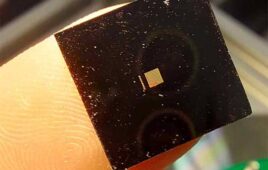
Drs. Alvin V. Terry (left) and David T. Blake [Image from Augusta University]
Researchers tested the electrical stimulation in monkeys. Using intermittent stimulation, the monkeys things five times longer in a standard memory test.
“That takes a monkey from being sort of a middle-of-the-pack performer to the top of the class,” Dr. David Blake, neuroscientist in the department of neurology at the Medical College of Georgia at Augusta University, said in a press release. “A monkey who is a poor performer becomes a middle-of-the-pack performer after two to three months of this stimulation.”
Scientists placed hair-thin electrodes into the brain to deliver electricity. The electricity delivery is designed to increase the activity of the nucleus basalis of Meynert, which is the area of the forebrain that is degenerated in Parkinson’s and Alzheimer’s diseases.
“The natural response of many brain systems to continuous input is to start to ignore the input,” Blake said. “In the case of Parkinson’s, deep brain stimulation is effectively down-regulating that part of the brain. What we wanted to do instead was to upregulate an area.”
The Augusta University researchers wanted to increase the amount of the chemical messenger acetylcholine in regions of the brain that have large concentrations of neurons and are essential for memory and cognition. To achieve this, the researchers started using continuous stimulation and had an unexpected decline in performance. Conversely, intermittent stimulation created more acetylcholine in the region and showed better performance.
In a 20-second interval, 60 pulses were administered followed by a 40-second period with no electrical stimulation.
The scientists suggest that there was a better performance due to increased levels of acetylcholine directly on neurons in supporting regions. It could also be due to a slight increase in blood flow to the brain regions.
After a few months of intermittent stimulation to the monkeys’ brains, the monkeys were more adept at the memory test without stimulation.
“There are two main classes of effects that acetylcholine has in the central nervous system,” Blake said. “It changes the way neurons talk to each other. It causes some neurons to become more active, some to become less active. The second class of effects is that it improves blood flow.”
There have been other advances in neurostimulation for Alzheimer’s and Parkinson’s that include anything from invasive implants to non-invasive electrode-filled caps and ear clips.
The team recently submitted a grant proposal to start a clinical trial for early Alzheimer’s sufferers.
The research was published in the journal Current Biology and was funded by the National Institutes of Health.






